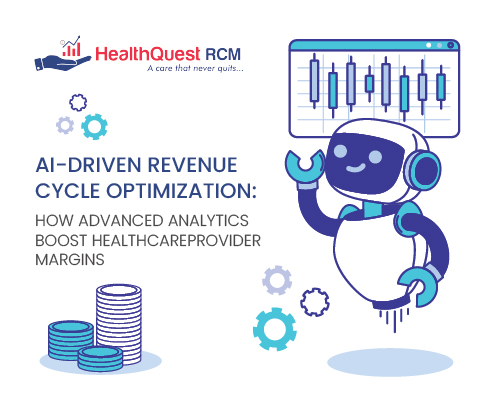Artificial intelligence is transforming revenue cycle management (RCM), enabling healthcare providers to optimize financial performance, reduce claim denials, and enhance compliance. AI-driven RCM solutions leverage advanced analytics to identify revenue leakage, predict disruptions, and improve cash flow. This guide explores how AI is reshaping healthcare financial management and boosting healthcare provider margins.
How AI-Driven Analytics Identifies and Prevents Revenue Leakage
Revenue leakage is a major challenge for healthcare organizations, often resulting from billing errors, underpayments, or inefficient claims management. AI-driven RCM solutions proactively address these issues by:
- Real-time Data Monitoring: AI-powered tools continuously analyze financial transactions, identifying anomalies before they cause revenue loss.
- Automated Coding and Billing Optimization: Machine learning applications ensure accurate medical coding, reducing claim denials and rejections.
- Predictive Analysis for Payment Delays: AI forecasts payment trends, helping providers take preemptive action against potential revenue disruptions.
By integrating AI into revenue cycle management, healthcare providers can prevent losses and maximize revenue optimization.
Real-World Examples: Hospitals and Labs Improving Cash Flow with AI-Enabled RCM Platforms
Case Study 1: Large Hospital Network
A multi-hospital network implemented AI-driven RCM to streamline claim processing, reducing denials by 30% and accelerating reimbursements by 20%. Advanced analytics identified patterns in rejected claims, allowing proactive adjustments before submission.
Case Study 2: Independent Diagnostic Lab
A diagnostic laboratory integrated AI-powered financial analytics to improve cash flow management. The result? A 25% increase in revenue collection efficiency and significantly fewer delayed payments from insurance providers. These real-world applications showcase how AI-driven RCM enhances financial performance and healthcare provider margins.
Predictive Analytics: Anticipating and Proactively Managing Revenue Cycle Disruptions
Predictive analytics plays a crucial role in revenue optimization by:
- Anticipating Claim Denials: AI evaluates historical claim data to identify high-risk submissions and suggests corrections before filing.
- Optimizing Revenue Streams: AI-powered insights help healthcare organizations make data-driven financial decisions, reducing reliance on reactive adjustments.
- Enhancing Patient Payment Compliance: AI-driven payment reminders and customized billing plans increase patient payment rates and reduce bad debt.
Reducing Denials and Claim Rejections Through Intelligent, Data-Driven Claim Scrubbing
AI-driven claim scrubbing tools ensure clean claim submissions, minimizing the risk of rejection. These tools:
- Check for Billing Errors Automatically: AI identifies missing information, incorrect codes, and discrepancies before claims are submitted.
- Enhance Payer-Specific Compliance: AI adapts claim formatting and documentation according to payer requirements, reducing rejections.
- Improve Reimbursement Rates: By refining the accuracy of claim submissions, healthcare providers experience faster approvals and fewer disputes.
With AI-driven RCM, healthcare organizations can significantly lower administrative burdens and maximize financial efficiency.
Insights into Machine Learning Applications Transforming Healthcare Financial Management
Machine learning is revolutionizing healthcare revenue cycle management by:
- Enhancing Financial Forecasting: AI predicts revenue trends, enabling providers to plan better for financial stability.
- Automating Prior Authorization Processes: AI accelerates approvals by analyzing insurance policies and matching claims with payer-specific requirements.
- Detecting Fraudulent Billing Activities: AI-driven systems identify unusual billing patterns, preventing fraudulent claims and ensuring compliance.
As AI and machine learning continue evolving, their role in healthcare financial management will expand, driving efficiency and revenue growth.
Preparing for AI-Driven RCM: Key Takeaways
AI-driven revenue cycle management is no longer optional—it’s a necessity for healthcare providers looking to improve margins and optimize revenue. By leveraging predictive analytics, machine learning applications, and automated claim processing, organizations can enhance compliance, reduce denials, and improve financial performance.
FAQ Section
AI-driven RCM refers to the use of artificial intelligence and advanced analytics in revenue cycle management to improve billing accuracy, reduce claim denials, and optimize financial performance.
AI enhances revenue optimization by identifying revenue leakage, automating claim processing, predicting financial trends, and improving cash flow management.
Yes, AI-driven claim scrubbing tools analyze data for errors, ensure compliance with payer requirements, and suggest corrections before submission, significantly reducing denials.
Predictive analytics anticipates payment delays, detects potential claim denials, and provides actionable insights to prevent revenue disruptions.
Machine learning is used for automated coding, fraud detection, financial forecasting, and optimizing prior authorization processes, making revenue cycle management more efficient.

